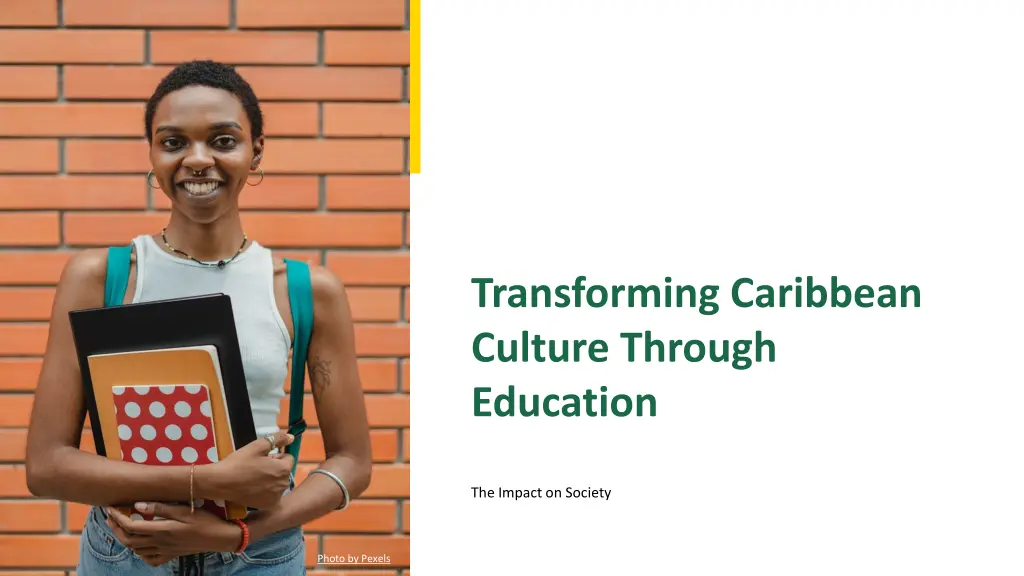
Transforming Caribbean Culture Through Education: Impact on Society
Unlock the potential of Caribbean culture through education. Explore the influence of education on societal values, socio-economic disparities, cultural preservation, and innovative approaches to learning. Address challenges in education access and envision the future of education in the Caribbean region.
Download Presentation

Please find below an Image/Link to download the presentation.
The content on the website is provided AS IS for your information and personal use only. It may not be sold, licensed, or shared on other websites without obtaining consent from the author. If you encounter any issues during the download, it is possible that the publisher has removed the file from their server.
You are allowed to download the files provided on this website for personal or commercial use, subject to the condition that they are used lawfully. All files are the property of their respective owners.
The content on the website is provided AS IS for your information and personal use only. It may not be sold, licensed, or shared on other websites without obtaining consent from the author.
E N D
Presentation Transcript
Transforming Caribbean Culture Through Education The Impact on Society Photo by Pexels
01 Education: A Catalyst for Change Table of Contents 02 Cultural Values and Education 03 Socio-economic Disparities 04 Primary Socialization in Schools 05 Secondary Socialization and Education 06 Education and Cultural Preservation 07 The Role of Religious Institutions 08 Challenges in Education Access 09 Innovative Approaches to Learning 10 Future of Caribbean Education 11 Thank You!
1 Education: A Catalyst for Change Unlocking Potential Education serves as a powerful tool for individual and collective growth, especially in Caribbean islands. It shapes values, beliefs, and practices that define communities, enhancing overall social progress. A well-educated populace contributes to economic prosperity and social cohesion in the region. The influence of education extends beyond academics, permeatingcultural norms and lifestyles. Photo by Pexels
2 Cultural Values and Education Building Foundations In the Caribbean, education is deeply embedded in cultural practices and societal expectations. It plays a pivotal role in shaping identity and preserving cultural heritage. The emphasis on education reflects a societal respect for knowledge and its transformative power. Cultural values significantly influence educational access and delivery. Photo by Pexels
3 Socio-economic Disparities A Double-edged Sword Despite education's benefits, inequalities persist in the Caribbeaneducational landscape. Middle-class families often have advantages that enhance academic success over lower socio-economic groups. Limited resources and support impact the educational experiences of disadvantagedstudents. Addressing these disparities is crucial for fostering inclusive growth and development. Photo by Pexels
4 Primary Socialization in Schools Learning Beyond Curriculum Schools play a vital role in primary socialization, teaching norms and values. They are environments where cultural beliefs are transmitted and reinforced among students. This socialization impacts interpersonal relationships and community engagement. Primary socialization prepares students for active participationin their cultures and societies. Photo by Pexels
5 Secondary Socialization and Education Broader Societal Influence Secondary socialization continues the learning process beyond the family unit. Peer interactions and societal institutions influence attitudes and behaviors. Educational settings expose students to diverse perspectives, enriching their understanding of the world. This exposure encourages critical thinking and adaptability in a globalized context. Photo by Pexels
6 Education and Cultural Preservation Heritage and Identity Education serves as a means for preserving and promoting local cultures and languages. Curricula often include elements of history, folklore, and traditions unique to the Caribbean. This educational approach fosters pride in cultural identity and promotes intergenerationalknowledge transfer. Cultural education strengthens community bonds and enriches the social fabric. Photo by Pexels
7 The Role of Religious Institutions Faith and Learning Religious schools in the Caribbean often hold higher prestige and rigorous academic standards. They provide moral education and instill values aligned with specific faith traditions. The competition between state-run and religious schools shapes educational choices for families. Religious education can influence societal views on various issues, from ethics to social responsibility. Photo by Pexels
8 Challenges in Education Access Bridging the Gap Access to quality education remains a challenge in many Caribbeanislands, particularlyfor marginalized groups. Geographic isolation, economic constraints, and inadequate infrastructure hindereducational opportunities. Efforts to bridge these gaps are essential for fostering equitable access to education. Collaborative initiatives can enhance educational resources and reach underrepresentedcommunities. Photo by Pexels
9 Innovative Approaches to Learning Embracing Change The Caribbean education system is evolving with innovative teaching methods and digital tools. Emphasizing experiential learning and critical thinking enhances student engagement. Adaptation of curricula to local contexts makes education more relevant and impactful. Innovations can help overcome traditional challenges and better prepare students for the future. Photo by Pexels
10 Future of Caribbean Education Vision for Growth Looking ahead, Caribbean education must prioritize inclusivity and relevance to meet diverse needs. Policies should focus on equity, diversity, and quality to foster sustainable development. Collaborations with global partners can enhance resources and create new opportunities. A robust educational framework will empower future generations to thrive in a dynamic world. Photo by Pexels
11 Thank You! Inspiring Change Together Thank you for your attention and dedication to understanding the impact of education on Caribbeanculture. By working together, we can uplift communities and foster a brighterfuture for all. Let's continue to advocate for equitable education that respects and nurtures cultural identities. Join us in this meaningful journey towards transformational education in the Caribbean. Photo by Pexels
